 |
|
  05.30.03 05.30.03
click to enlarge
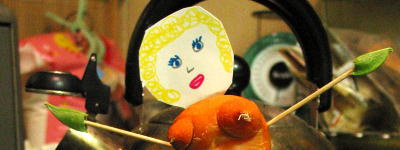

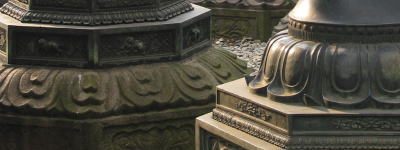

We got a funny email from home the
other
day, a nice piece of gossip.
A friend of ours who used to live here in
Tokyo, lets just call her Nancy, moved back
to Canada about six months ago. Being a pretty
and single girl in Tokyo she made a lot of
friends while here.
Apparently, she recently got an email from
a guy that she had a brief fling with. Here
is how our mutual friend describes it:
| Nancy just called and some guy called Ian
from Japan emailed her professing his undying
affection for Nancy. The catch is she "jokingly"
told him she was Jewish in an email and he
thought she was serious and he will only
marry a Jew because his mother told him that
"goyeh" are only for practice.
He felt like he could finally tell her now
that he knows she is jewish. |
That's a 'foot in the mouth' story if I ever
heard one.
  05.27.03 05.27.03
click to enlarge

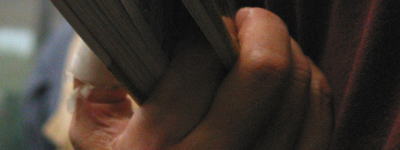
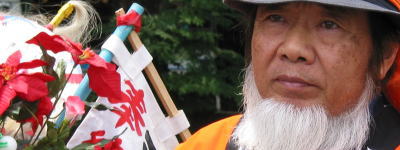
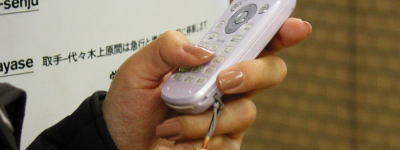
My Japanese language teacher was talking
the other day about how Japanese people often
speak indirectly. In other words, they tend
to drop a lot of hints. This is all done
in the name of tact, but being an oafish
Canadian, these hints just seem to bounce
right off my beaver cap and out into space.
When I first came to Tokyo in 1998 I was
supposed to stay with a friend in Shinagawa-ku,
a nice part of Tokyo. Unfortunately, his
father was visiting at the time and there
was no room for me to stay in his tiny apartment.
So, because I was on a tight budget, I had
to stay at the Boshi, a cheap-ass transient
worker's motel on the bad side of town. The
Boshi had only two types of rooms available:
small and medium. I took the small room,
about seven feet by three feet in size.
There were a lot of other shoe-string travelers
staying at this hotel, and we all shared
a common-room and a small kitchenette. I
made friends with quite a few people there,
but there was one girl in particular, Jessica
from England, who I spent the most time with.
Jessica seemed to have a thing for me, but
as I recall, I wasn't particularly interested
in her because she was rather plain and had
an unfortunate predilection for dressing
in bad 80's-style clothes -- i.e., royal
blue short sleeve shirts with oversized,
droopy collars and dozens of extraneous zippers
placed at odd angles all over.
Being new in town, Jessica and I went around
quite a bit doing things like sorting out
visas, looking for jobs, and checking out
the housing situation. One day we were in
Ikebukuro, northwest Tokyo, and being tired
from walking all afternoon, we decided to
have lunch at a Subway Sub restaurant --
an American sandwich chain.
We trudged in and went up to the counter.
I ordered a subway club and she got a tuna
on brown bread. We took our trays and sat
down at one of the cramped little tables.
I sucked back my sandwich in about two minutes,
and Jessica made quick work of her's too.
I lit a cigarette, Lark brand, and Jessica
and I started to chat about our day. We talked
about the other people in the hotel, and
about Tokyo in general. We gabbed and chatted
at length.
I was smoking my third cigarette when
the
manager came out from the back and
walked
up to our table.
He stood there for an awkward moment
humming
and hawing, hands clasped together
as if
in prayer, sucking air in between his
teeth
so that it made a hissing sound.
Finally, he turned to me and said, "Excuse
me. My restaurant is very small."
I looked back at him with a blank expression
on my face waiting for the next sentence,
but none came.
I thought to myself, 'Why is this guy
telling
me about his restaurant? I don't give
a shit
about his restaurant.'
Again he says to me, sweating and looking
like somebody who has just had a pickle stuck
up his ass, "Ah...Yes..My restaurant
is very small."
'Again about his damn restaurant!' I thought.
Then I had a minor revelation, 'Maybe he
just wants to practice his English!' People
do that all the time in Japan, or so I thought.
So I replied to him, in loud, clear, and
stilted English, "YES IT IS. BUT IT
IS VERY BEAUTIFUL."
He says again, "Ah...Ah...My restaurant
is VERY small."
And I say, with a big grin on my face, "YES
IT IS. MAYBE YOU SHOULD RENT A BIGGER RESTAURANT."
Then, using her superior British sense of
tact, Jessica came to the rescue and broke
up our tortuous and ill formed interaction.
She leaned over the table towards me and
quietly said, "I think that he wants
us to leave. He needs the table."
My face went slack, "Oh. Ya. Of course.
I see."
We gathered up our stuff and slinked
out
the door. The manager, equally vexed,
scurried
back into the kitchen to cut up some
more
pickles or something.
I never did tell my teacher about the 'My
restaurant is very small' incident. Maybe
she could use it in one of her lessons. I
think that it's pretty classic.
  05.24.03 05.24.03
click to enlarge

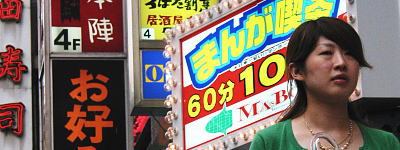
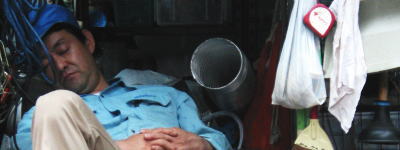
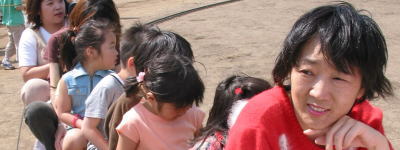

One of my pictures just appeared in the New York Times (May 25th) in a story about photoblogs. I
haven't read the article yet, but Laura in New York is going to send me a copy.
When the photo editor contacted me he didn't
have any particular picture in mind. He just
asked me to send him some pictures that "said
Tokyo." The funny thing, for me at least,
is that the picture that he chose was really
atypical. It's not like most of the other
portraits on hunkabutta because the two guys
in it were actually posing for the picture.
The vast majority of the pictures that I
take are strictly candids -- i.e., the subject
has no idea that I'm taking the picture.
The article says that they were "my
friends," but that's not true. As a
matter of fact, I don't even know who they
are. I was hanging out in Hachiko square
in front of Shibuya station that day trying
to take this picture of a drunken homeless guy sliding around
on his ass. At one point I looked over my
shoulder and saw two young punk guys with
guitars looking like extras from the X-files,
so I decided to ask them if I could take
their picture. Their response was, "Yeah,
yeah! Take lots."
At the time I didn't think anything of it.
I take countless pictures, pretty much every
day. These two guys were trying to get attention
and wanted their pictures taken. I wanted
a good picture. Four months later they're
looking out at the world from the Arts &
Leisure section of the New York Times for
the whole world to see -- but nobody knows
their names or who they are.
Strange how these things work sometimes.
  05.21.03 05.21.03
click to enlarge
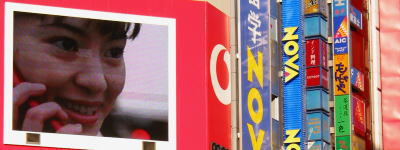
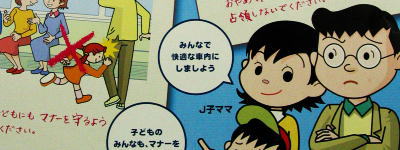


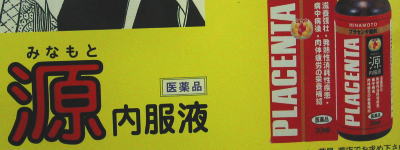
Karen's cousin David from Canada wrote to
me recently and asked me if I could send
him some links to Japanese web sites dealing
with patio furniture. Apparently, he's trying
to do some business research. Like the good
cousin-in-law that I am, I promptly went
to Japanese Google and tried my best to type
in 'deck chair' in Japanese.
Because my Japanese is so crappy, I couldn't
find any Japanese patio furniture sites,
but the exercise got me thinking about the
complexity of the Japanese writing system.
It's something that I take for granted now
because I study it at school, but written
Japanese is a royal pain in the ass. I thought
that maybe some of you might be interested
in how it works.
The Japanese writing system, like so many
other things here, is an amalgamation of
several separate systems. Technically there
are three recognized Japanese scripts: kanji, which is the Chinese character system,
hiragana, which is an indigenous phonetic system
of around 40 characters based mainly around
consonant/vowel combinations (i.e., ka, ki,
ki, ke, ko), and katakana, which is a second phonetic system representing
the same sounds found in hiragana but used for foreign import words (i.e.,
taxi, computer). However, in practice there
is a fourth system: romaji, which is essentially the Roman alphabet
(i.e., A, B, C, D,....) used to write both
foreign and Japanese words.
So, when you want to learn Japanese, you
have to learn all of these systems simultaneously.
Kanji is the real tough one. An extremely
literate person (say a newspaper editor)
will know over 20,000 kanji, but a bare minimum
is considered to be around 2,000.
In the West, there is a general assumption
that a Chinese character is a kind of pictograph,
an abstract representation of its meaning
(like an Egyptian hieroglyphic), but this
is not exactly true. Kanji do have have an
intrinsic meaning, but they are usually read
phonetically. The problem is that one kanji
can have many readings (e.g., the same kanji
can be read as KI or HO or TOMA or whatever,
depending on context). Some readings are
based on the original Chinese word that the
kanji was meant to represent and some are
based on a Japanese interpretation.
This is all getting confusing so I'll give
you an example. In Japanese, nan ji means 'what time'. Ji is usually written using one specific kanji,
but there are actually dozens of kanji with
the reading ji, you just have to remember which one is
the ji used to write 'time'.
Here is ji in romaji:
Ji
In hiragana:

In katakana:

In kanji:

And other kanji that read as ji but don't mean time and are used for other
words:
 
Anyhow, I'm going to have to ask one
of my
friends how to say 'patio chair' in
Japanese.
I have a feeling that it won't be easy.
I
hope that my cousin-in-law will be
patient.
|
|
|
 |


17 comments so far